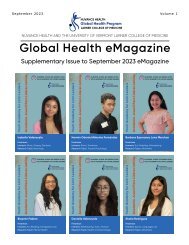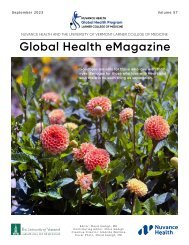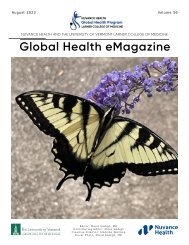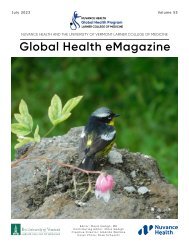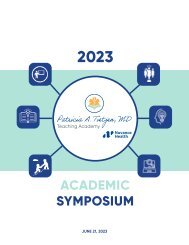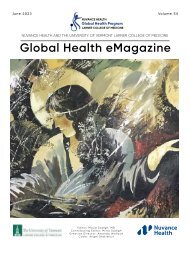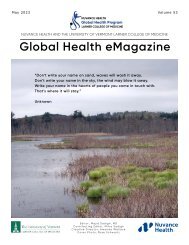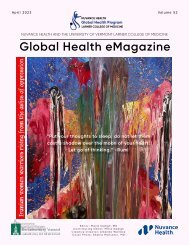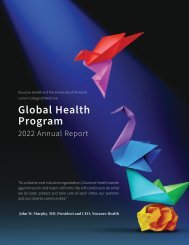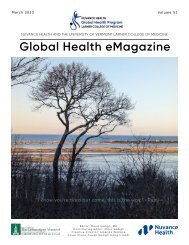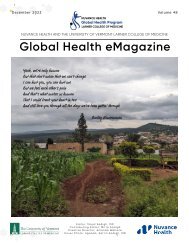emagazinenov2022
Create successful ePaper yourself
Turn your PDF publications into a flip-book with our unique Google optimized e-Paper software.
OUR PEOPLE,<br />
OUR MISSION<br />
Global Health<br />
eMagazine<br />
November 2022<br />
Highlights<br />
Spotlight<br />
Reflections<br />
Global Local<br />
UNG77<br />
Among the Letters<br />
Nursing Division<br />
Decolonization<br />
Art to Remind Us of Who<br />
We Can Be<br />
Our Beautiful Planet<br />
Ebola in Uganfda<br />
Article of the Month<br />
Video of the Month<br />
Congratulations<br />
Global Health Family<br />
Photo News<br />
Photo Gallery<br />
Resources<br />
Global Local<br />
Health Disparities within our Borders<br />
Section Editor: Ritesh Vidhun<br />
Review and Analysis of a Research<br />
Paper<br />
Written by Ritesh Vidhun<br />
Change in birth outcomes among infants born<br />
to Latina mothers after a major immigration<br />
raid.<br />
Authors: Nicole L. Novak, Arline T. Geronimus, and<br />
Aresha M. Martinez-Cardoso<br />
Link: https://www.ncbi.nlm.nih.gov/pmc/articles/<br />
PMC5837605/<br />
This month’s piece will discuss a topic covered in a class I am currently taking<br />
with Dr. Leah Abrams at Tufts University called “Social Epidemiology.” The course<br />
explores how population health outcomes are impacted by social determinants<br />
such as education levels, neighborhood, occupation, and immigration status.<br />
Many of the inequities seen in the U.S. healthcare system can be attributed<br />
to these social factors, and has been especially present during the COVID-19<br />
pandemic. Recent trends have further emphasized the need for studying this<br />
field as understanding these concepts can help healthcare practitioners better<br />
treat their patients thereby improving the overall health of a community.<br />
One of the recent pieces I analyzed studied how immigration raids impact health<br />
outcomes among infants born to Latina mothers. This research was particularly<br />
powerful as challenges faced by undocumented immigrants are typically<br />
overlooked by society. Furthermore, this work explores how actions taken against<br />
undocumented individuals affect not only documented immigrants, but also US<br />
citizens of Latino descent. The authors felt that there was no present research<br />
on the ‘spillover effects’ on Latinos born in the U.S., and used data from birth<br />
certificates and health records to answer their question. In particular, they<br />
looked into the 2008 federal immigration raid in Postville, Iowa which was the<br />
largest such raid in U.S. history. Data was taken from 37 weeks prior to this event,<br />
and compared with data over 37 weeks after.<br />
On May 12, 2008, 900 agents from the US Immigration and Customs Enforcement<br />
(ICE) agency were deployed, and arrested 398 employees of a meat-processing<br />
plant, of whom 98% were Latino. This incident separated hundreds of families and<br />
caused serious trauma to the community. Some were found guilty of identity theft<br />
and had to serve time in a corrections facility, but the majority of individuals were<br />
deported to their country of origin. This shook the rest of the Latino community<br />
in Iowa as agents had racially profiled individuals who they suspected to be<br />
undocumented.<br />
Global Local continued on next page >><br />
12




